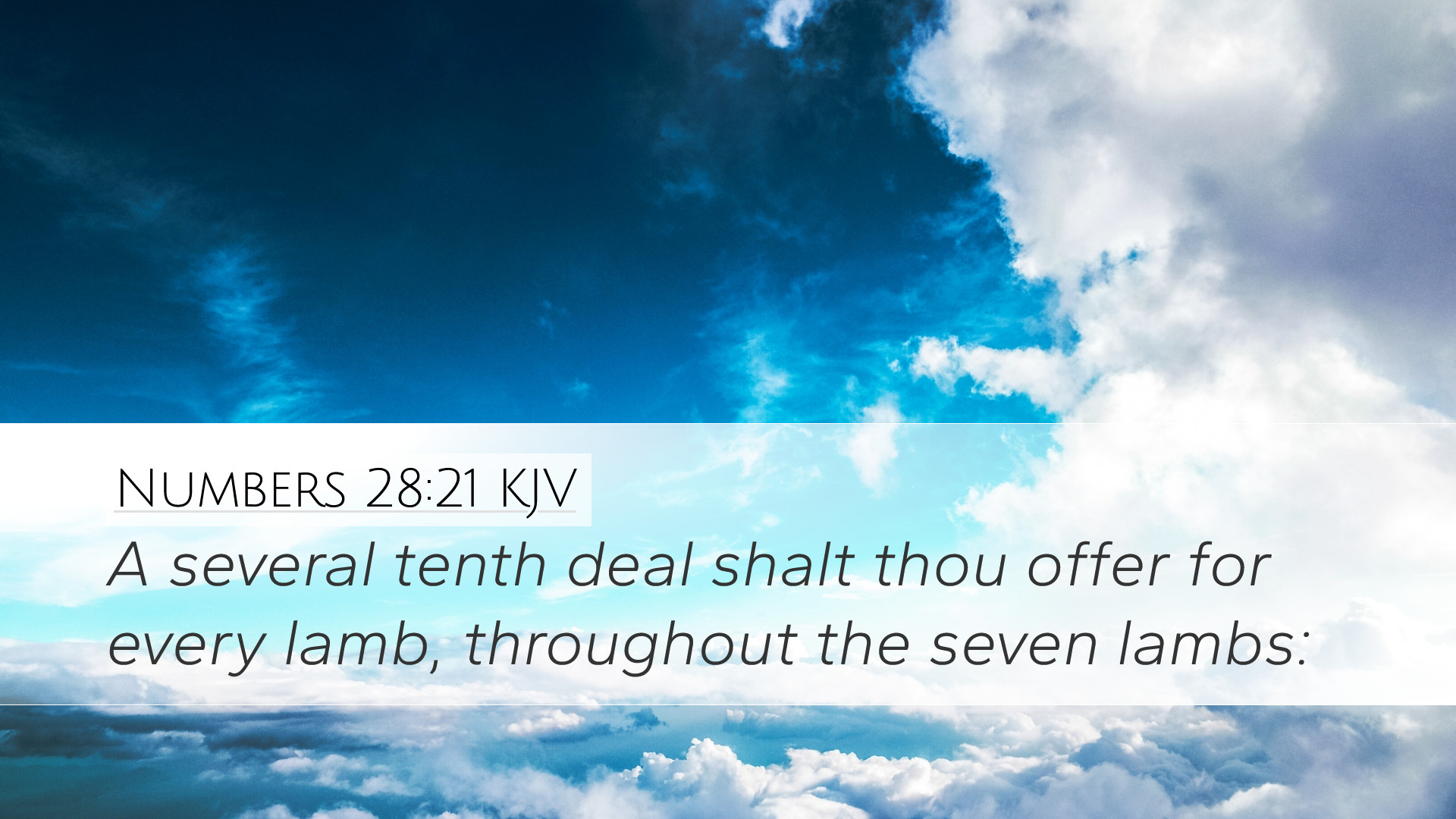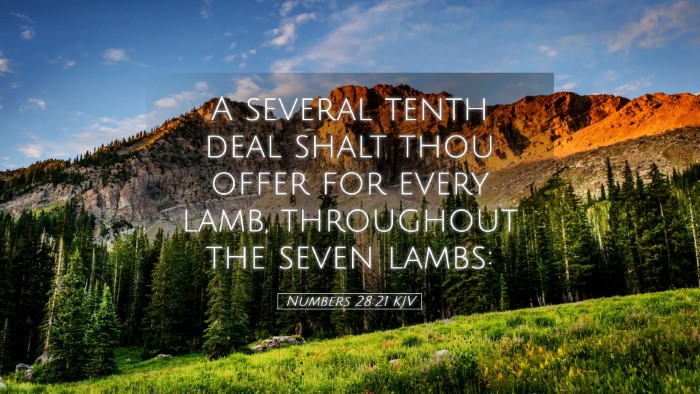Commentary on Numbers 28:21
Bible Verse: "And they shall offer a sacrifice, an offering made by fire, of a sweet savour unto the LORD." (Numbers 28:21, KJV)
Introduction
The Book of Numbers contains detailed instructions concerning Israel's worship and sacrifices, emphasizing God's desire for a specific order in their offerings. This particular verse, Numbers 28:21, highlights the significance of the offerings made by the Israelites, designed to maintain proper worship and relationship with God. This commentary synthesizes insights from public domain sources like Matthew Henry, Albert Barnes, and Adam Clarke to provide a comprehensive understanding of the verse.
The Significance of Offering
In ancient Israel, offerings held profound importance as expressions of devotion and obedience to God. The Israelites were commanded to offer sacrifices regularly, and this verse underscores the idea that these offerings are not merely ritualistic but are vital in maintaining their covenant relationship with the Lord.
- Matthew Henry: Henry emphasizes that the offerings of fire denote the sanctity and seriousness of worship. They symbolize the people's commitment and represent their dedication to God.
- Albert Barnes: Barnes points out that the phrase "sweet savour" indicates that God finds delight in the offerings, reflecting His acceptance and the believers' sincere worship.
- Adam Clarke: Clarke notes that the continual offerings serve as reminders of God's mercy and provision, reinforcing the need for constant acknowledgment of God's goodness in the lives of the worshippers.
Understanding 'Sweet Savour'
The term "sweet savour" is a critical theological concept in the Old Testament sacrificial system. It signifies that the offerings were pleasing to God, accepted as atonement for sin and as a mark of obedience.
- Theological Implications: Both Henry and Barnes agree that this notion of "sweet savour" transcends the physical offering; it encapsulates the attitude and intent behind the sacrifice. True worship involves both the right action and the right heart.
- Application to Worship: Clarke asserts that modern believers should view their worship similarly—it's not merely the act of offering but the posture of the heart that matters most to God.
Regularity and Ritual
Numbers 28 establishes a rhythm of sacrificial offerings at specific times (daily, weekly, monthly, and annually) which serves a dual purpose: maintaining the Israelites’ covenant with God and fostering a community identity centered around worship.
- Matthew Henry: He explains that regular sacrifices were meant to keep God at the forefront of the people's minds, ensuring continual awareness of their dependence on Him.
- Albert Barnes: Barnes interprets this regularity as a means of discipline in faith—a structured approach to connecting with God.
- Adam Clarke: Clarke reiterates that even in today’s context, regular worship and commitment to God through rituals or practices (like prayer, communion, etc.) play a significant role in nurturing spiritual life.
The Role of Sacrificial System
The sacrificial system outlined in Numbers is unique to the Old Covenant and foreshadows the ultimate sacrifice of Christ in the New Covenant.
- Typological Interpretation: Henry and Clarke both highlight that the offerings in Numbers should be viewed typologically—they point towards Christ, the perfect and final sacrifice, which fulfills the demands of the law.
- New Testament Connection: The concept of sacrifice remains fundamental in Christian theology, with all believers called to present their lives as living sacrifices, integrating the principles established in the Old Testament with New Testament teachings (Romans 12:1).
Conclusion
Numbers 28:21 provides deep insights into the nature of worship and the importance of maintaining a relationship with God through regular, heartfelt offerings. It teaches that our worship should transcend ritual and come from a place of genuine devotion. Both the historical context of the Israelites and its application to contemporary worship reveal God’s desire for a relationship founded on regular acknowledgment of His goodness, mercy, and grace.
In applying the lessons from this verse, pastors, students, and scholars should reflect on the heart behind their worship and strive to maintain a consistent, vibrant connection with God through their daily lives and corporate gatherings.


